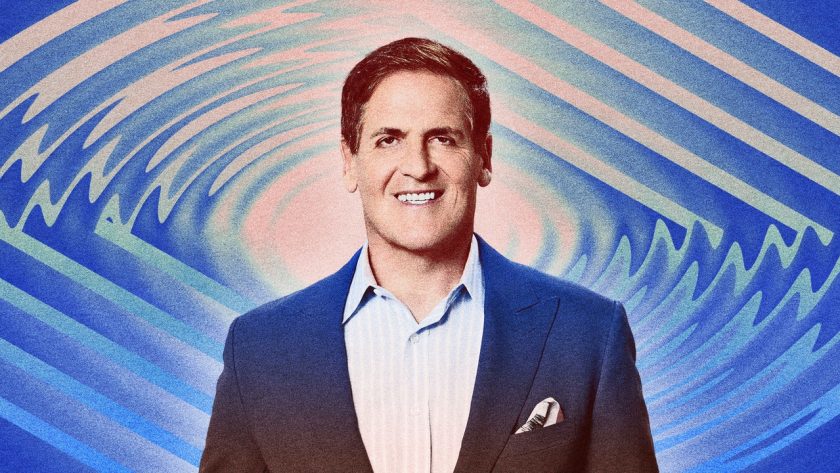It’s early evening in Los Angeles, and as Mark Cuban drives away from the Sony lot where he’s just filmed another episode of Shark Tank, his day isn’t close to done. That’s because his role on the ABC reality show, now entering its 15th season, is just a glimpse of who he really is—a serial investor who literally cannot stop betting on novel ideas. Wearable tech that treats vertigo. A platform connecting police with their communities. Animatronic dinosaurs. Hundreds of companies. He’s surely one of the most pitchable kingmakers on the planet, partly because he’s made his email address public and partly because he seems like that cool uncle you want to run an idea past over a beer at Thanksgiving.
He’s so approachable, in fact, that it’s easy to forget that he also owns the Dallas Mavericks and is worth just north of $5 billion. Now 65, he retains the hustle he honed growing up outside Pittsburgh, where his dad was a car upholsterer and his mom seemed to have a new job every week. At 12, he was selling garbage bags door-to-door so that he could buy a pair of basketball shoes. At 20, while a student at the University of Indiana, he bought a Bloomington bar; when it shuttered, he started a software company he later sold, at 32, for $6 million. This was the mid-’90s, the dawn of the dot-com boom, and after a brief “retirement,” he got in on a friend’s business, Broadcast.com, whose big idea was—as the show Silicon Valley would later term it—“putting radio on the Internet.” In 2000, just after they sold the business to Yahoo, for $6 billion, Cuban bought the Mavericks and quickly became that rarest of owners: a superstar as famous as his players.
In the NBA he’s been an iconoclastic force, constantly questioning refs, commissioners, and all kinds of conventions. He’s brought a similarly disruptive energy to his latest venture, Cost Plus Drugs, an online discount pharmacy offering generic medications at a modest markup. The goal, he’s said, is to “fuck up” Big Pharma. That business, like many others, started out with a cold pitch that landed in his inbox. Cuban spoke with GQ by phone about what he looks for in a proposal, how he stays productive, and what he thinks about the 2024 election, Elon Musk, NBA officiating, and much more. The conversation was warm and loose and seemed like it might go on for hours—until he excused himself, around eight o’clock, to go answer some emails.
GQ: Are you just wrapping Shark Tank now? We’re running up on 7 p.m.
Mark Cuban: For today, yes. This is early for us.
Do you typically work into the night?
It really depends. We try to get 9 or 10 deals in. You have the entrepreneurs waiting, we want to get to all of them.
I imagined success meant you get to work less. Do you feel you need to work longer hours to sustain it?
No, it’s nothing like that at all. I love what I do, right? This is who I am. I love to challenge myself intellectually. I’m super-competitive. And business is super-competitive. It’s the ultimate sport. It’s not about working more. It’s about spending more time doing the things I love.
But you’ve said you wanted to retire at 35. What happened to that dream?
You’ve got to ask what the definition of retirement is. The definition of retirement is getting to pick exactly what you want to do, whatever that is. When I sold MicroSolutions, I bought a lifetime pass on American Airlines, and I just went and partied with as many people as I possibly could. That lasted for four years, maybe. Then, when we had the chance to start Audionet and Broadcast.com, I got right back into it because I was bored doing nothing. I was bored just having fun.
People say, “Well, why do you keep on working? Why do you keep on starting companies?” For the exact same reason I still play pickup basketball. I’m just competitive. You’re not old until you act old. Being able to compete just keeps the juices going, keeps my mind sharp. I remember when I was the youngest kid walking in and trying to sell to people three times my age. Now I’m on the other side of the spectrum. I’m competing with kids a third of my age, and I love it.
It seems both exciting and depressing. It’s great to know that work can deliver meaning even though you don’t have to do it. The depressing side is maybe our nature is always drawn to be working.
No, no, no. I disagree completely. When you’re working for somebody, and you’re in that grind—and I was always really bad at this—you’re always obligated to somebody else. And that’s the difference. I’m obligated to nobody but myself.
If I want to do something with the kids, great, I can do that. I want to do nothing, great. I can be sitting on the beach. With your editors, publishers, they want you on a Zoom call, they want you in the meeting, you go to that meeting. For me, 99 percent of everything I do is via email. So I can be on the beach, it can be between Shark Tank pitches. It’s all how I define things. I can set the parameters. It’s not work, right? It’s picking and choosing exactly what I want to do. Now, if it was a situation where it’s like, I’m showing up at an office every day, I’m punching a clock, being told what to do? No. I’ve been through that. All that. But that’s not my life right now. And that’s the difference.
Our society can’t have everybody become entrepreneurs, though. We need people to be executives and foot soldiers within companies. So how do people decide whether they want to be someone like you, or someone who works at one of your companies?
They just have to be themselves…. Do you have any brothers or sisters?
Yes, two brothers.
Okay, so they’re probably nothing like you, right?
That’s correct.
I have two brothers, nothing like me, right? And even though you come from the same household, you grow up the same, everybody’s different. Everybody goes through that process of trying to figure out who they are. My three teenagers, my oldest is a sophomore in college. And she’s like, “Well, I’m not sure.” I’m like, “You don’t have to know what you’re going to be.” Because everything’s always changing. And you’re changing, and you’re evolving. What you’ve got to be able to do is be agile and excited about learning to be curious. That’s what’s most important. If you’re curious, and you’re agile, you’ll get there eventually. It might not happen when you want it to, but you’ll get there eventually.
Does fear motivate you?
Yes. Sometimes, yes.
People are often motivated by fear, whether it’s fear of legacy, fear of going broke. Is that a good source?
It really depends on where you are in your life. When I was in my early 20s, and I was broke, like, on my ass life broke, I was terrified. I was having fun, I enjoyed my life. But you’re not two, three years out of college, sleeping on the floor, just having gotten fired, and thinking, This is exactly the way I planned it.



